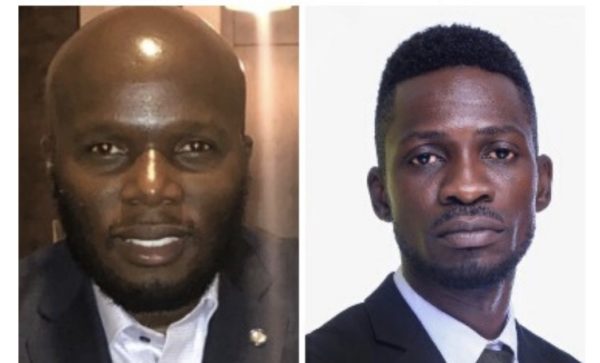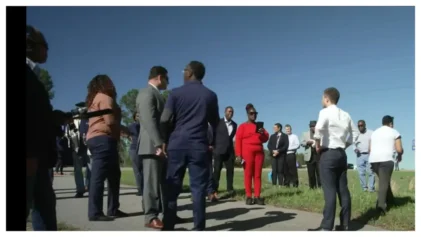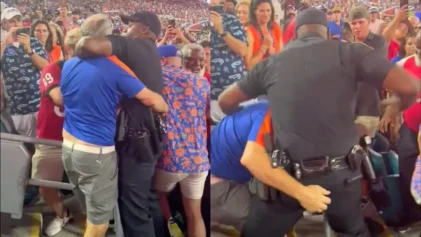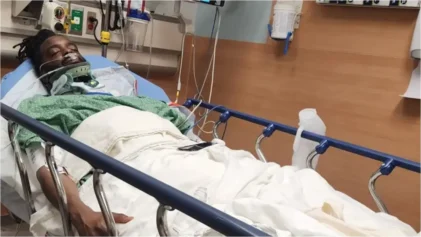
In light of the coronavirus pandemic, African people living in China face racist treatment, including evictions, police harassment, confiscation of passports, forced COVID-19 testing, and denial of service in places such as restaurants, hospitals and hotels. In response to this disturbing treatment, Atlanta Black Star CEO Neil Nelson and Ugandan MP, musician and activist Bobi Wine have joined forces to airlift affected African people out of China and to transport them to an African or Caribbean country.
Disturbing reports of discrimination recently have begun emanating from the port city Guangzhou in southern China — home to one of Asia’s largest African population at a government-estimated 150,000 in 2014 — with accounts of police evicting 100 Kenyans from their apartments and arresting Africans over unfounded rumors they were spreading coronavirus. Viral videos of Africans rendered homeless have incensed the international community. McDonald’s China issued an apology after one of its majority state-owned restaurants banned African customers, with a sign stating “black people are not allowed to enter the restaurant.”
This week the U.S. Consulate General of Guangzhou issued a health alert regarding discrimination against Black people in the city, warning African-Americans to avoid the area, as “police ordered bars and restaurants not to serve clients who appear to be of African origin.” Further, “local officials launched a round of mandatory tests for COVID-19, followed by mandatory self-quarantine, for anyone with ‘African contacts,’ regardless of recent travel history or previous quarantine completion.” Some African-Americans have reported hotels and other businesses refusing to do business with them.
Around 300 Africans and African-Americans living in China say they want to leave the country. Atlanta Black Star is looking for an airplane that will transport 285 passengers from Guangzhou to some location in Africa, and has sourced and received estimates from private charter plane providers. “As Black institutions we just can’t do what other institutions do,” Neil Nelson told Atlanta Black Star, noting that this moment provides Black people an opportunity to prepare for future emergencies.
As Nelson secures resources for the airlift, Ugandan MP Bobi Wine will identify an African or Caribbean nation to welcome those Africans fleeing China during the pandemic. “I think the airlift is important because at such a time, everybody has to need to feel human, to feel deserving and loved. This is a pandemic that was not caused by people, by Africans,” Bobi Wine told Atlanta Black Star. “We thought if we can pull together our resources it was an important thing to do. Everything else is secondary.”
Recent accounts of anti-African violence are part of a longstanding pattern of racism in China, including perceptions of Black people as uncivilized and dirty, and fears of Black criminality and interracial marriage. In 1988, rioting Chinese students at Nanjing University attacked African students and shouted, “Down with the black devils!” Reflecting fears of a Black invasion and polluting of Chinese blood, a Chinese official offered to “solve the problem of the black population in Guangdong,” warning “Black brothers often travel in droves,” and “Africans bring many security risks,” including drugs, violence, sexual harassment, AIDS and Ebola.
In 2016, a Chinese laundry detergent commercial depicted a Black man scrubbing off his dark skin and turning into a pale Chinese man. Today, Winnie Zhong Feifei — born in China to a Congolese father and a Chinese mother — faces an online barrage of racially offensive comments after her selection for a television singing competition.
Black people in China are afraid and desperate. One African-American man living in Shenzhen wants to be evacuated immediately. “Due to the recent surge in acts of discrimination against those of African descent and the escalating political tensions between the United States and China, I feel that for me…levels of security and safety have drastically decreased,” he said to Atlanta Black Star via email. “The rise in instances of fear-based reactions and treatment when in public and being reprimanded and officially warned after having shared information about recent ongoings related to Africans in China … have led me to believe affairs are potentially headed toward an even more dangerous place.”
“I spent 9 hours in the custody of Chinese police yesterday. Thank God they let me go,” said one African member of a rescue chat group. “We’ve found ourselves in uncharted territory and it’s time for us to go home and build Africa,” said another. “Today night, they came to our house too,” another person said. “We need to go home.”
Nelson believes this situation is delicate for African leaders, who must walk a fine line given China’s role as an emerging superpower embedded in the economic fabric of African nations. China is Africa’s largest trading partner, comprising 60 percent of foreign investment in Ethiopia, and holding 80 percent of Nigeria’s debt. As China flexes its muscles in the motherland, with 1 million Chinese migrants in Africa, Chinese officials deny racial discrimination exists in their country.
“These aren’t make-believe things, these are real things that are happening. China can say they love Africa. Of course, they want the resources,” Nelson said. “This is not about China as much as Black people standing up to support Black people regardless of the perpetrator or the disrespect for Black people. That’s why our hashtag is #SavingOurOwnSouls. … It’s about Black people looking out for ourselves.”
Nelson added, “History has taught us that the interest and security of African people are interconnected. And what happens to one group today will likely happen to the next tomorrow if we fail to act on the first occasion.”
Wine said, “This is most importantly an issue of racism against Black people, and we expect anybody who is concerned about the dignity and rights of African people to take this seriously.” He then offered a message for the African diaspora: “I would like to call upon anybody and everybody that can influence opinion, our fellow Black people, our entertainers and celebrities to treat this with importance. This is important in how Black people will be treated all over the word. It is important that we save our own souls.”


